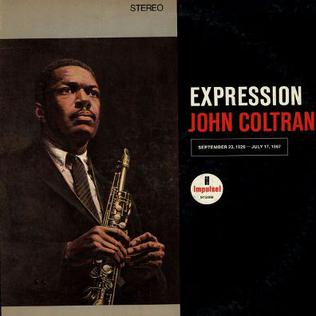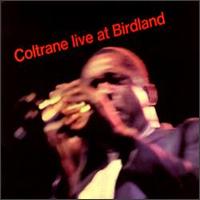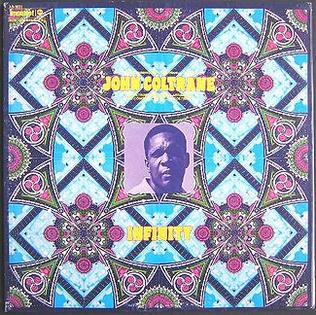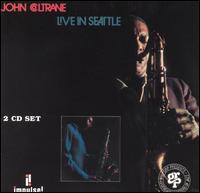
John William Coltrane was an American jazz saxophonist and composer. Working in the bebop and hard bop idioms early in his career, Coltrane helped pioneer the use of modes and was one of the players at the forefront of free jazz. He led at least fifty recording sessions and appeared on many albums by other musicians, including trumpeter Miles Davis and pianist Thelonious Monk. Over the course of his career, Coltrane's music took on an increasingly spiritual dimension, as exemplified on his most acclaimed albums A Love Supreme (1965) and Ascension (1966). He remains the most influential saxophonist in music history and has received numerous posthumous awards, including a Pulitzer Prize in 2007, and was canonized by the African Orthodox Church. His second wife was pianist and harpist Alice Coltrane. The couple had three children: John Jr. (1964–1982), a bassist; Ravi, a saxophonist; and Oran, also a saxophonist.

Rashied Ali, born Robert Patterson was an American free jazz and avant-garde drummer best known for playing with John Coltrane in the last years of Coltrane's life.

Interstellar Space is a studio album by American jazz saxophonist John Coltrane, featuring drummer Rashied Ali. It was recorded in 1967, the year of his death, and released by Impulse! Records in September 1974.

Sun Ship is a posthumously released jazz album by tenor saxophonist John Coltrane recorded on August 26, 1965. Along with First Meditations, recorded a week later, it was one of the last recording dates for Coltrane's "Classic Quartet" with McCoy Tyner, Jimmy Garrison, and Elvin Jones. The recording occurred shortly after a thirty-seven minute long performance by the quartet, with Archie Shepp added as a second tenor player, at Soldier Field in Chicago which was described by Ben Ratliff as "a famous breaking point — a Dylan-at-Newport, or a Rite of Spring," with music that he described as "jagged and vociferous... It aggravated a great part of the crowd, prompting, according to some witnesses, a large exodus."

Live At The Village Vanguard Again! is a live jazz album by saxophonist John Coltrane. Recorded in May 1966 during a live performance at the Village Vanguard jazz club in New York City, the album features Coltrane playing in the free jazz style that characterized his final years. The lineup features Coltrane's quintet, with Coltrane on tenor and soprano saxophones, bass clarinet, and flute, Pharoah Sanders on tenor saxophone and flute, Alice Coltrane on piano, Jimmy Garrison on bass, and Rashied Ali on drums, supplemented by Emanuel Rahim on percussion.

Live in Japan is a four-disc box set by American saxophonist John Coltrane and his last group, a quintet featuring Coltrane, his wife/pianist Alice, saxophonist/bass clarinetist Pharoah Sanders, bassist Jimmy Garrison and drummer Rashied Ali. The 4-CD set compiles all the music issued as three albums in the seventies by Impulse!; Concert In Japan, Coltrane In Japan and Second Night In Tokyo (1977, Japan 3-LP. The first CD issues were by Impulse! Japan as two 2-CD sets: Live In Japan Vol. 1 and Live In Japan Vol. 2. The US 4-CD edition includes both of these volumes, with identical mastering from the original mono tapes. The side six interview from "Second Night In Tokyo" has never been reissued on any CD edition.

Ascension is a jazz album by John Coltrane recorded in June 1965 and released in 1966. It is considered a watershed in Coltrane's work, with the albums recorded before it being more conventional in structure and the albums recorded after it being looser, free jazz inspired works. In addition, it signaled Coltrane's interest in moving away from the quartet format. AllMusic called it "the single recording that placed John Coltrane firmly into the avant-garde".

The Olatunji Concert: The Last Live Recording is the Impulse! Records-released final live recording of saxophonist John Coltrane, recorded April 23, 1967, at the Olatunji Center of African Culture in New York and released on Compact Disc in 2001. The album consists of two songs—"Ogunde", which Coltrane also recorded for his final approved album, Expression, and an especially free-form "My Favorite Things", which Coltrane had performed live regularly since 1960. The recording was made for broadcast on Billy Taylor's local radio station, WLIB. The Olatunji Concert was not Coltrane's last show, but rather, his penultimate—he would play once more on May 7, 1967, in Baltimore.

Expression is an album by jazz saxophonist John Coltrane, recorded in early 1967 and released in late September of that year, around Coltrane's birthday, and after Coltrane's unexpected death. This was the first posthumous release of a Coltrane recording.

Coltrane "Live" at the Village Vanguard is a live album by jazz musician John Coltrane, released in February 1962 on Impulse Records. It is the first album to feature the members of the classic quartet of Coltrane with McCoy Tyner, Jimmy Garrison, and Elvin Jones, as well as the first Coltrane live album to be issued. In contrast to his previous album for Impulse!, this one generated much turmoil among both critics and audience alike with its challenging music.

Live at Birdland is an album by jazz musician John Coltrane which was released on January 9, 1964 by Impulse! Records. Despite its title, only the first three tracks were recorded live at the Birdland club; the remainder are studio recordings. Among them is "Alabama", a tribute to four children killed in the 16th Street Baptist Church bombing, a terrorist attack at a Birmingham, Alabama church by white supremacists. The album's original pressing accidentally included a false start - this was corrected in later copies, but restored in CD editions. The album also features a live recording of "I Want to Talk About You", a song Coltrane had recorded on his 1958 album Soultrane, this time with an extended cadenza.

First Meditations is an album by John Coltrane recorded on September 2, 1965 and posthumously released in 1977. It is a quartet version of a suite Coltrane would record as Meditations two months later with the additions of Pharoah Sanders as a second tenor saxophone and Rashied Ali on drums. Along with Sun Ship, recorded a week earlier, First Meditations represents the final recordings of Coltrane's classic quartet featuring bassist Jimmy Garrison, drummer Elvin Jones and pianist McCoy Tyner. The "Meditations" suite on this album consists of five movements.

Infinity is an album credited to John Coltrane, released on Impulse! Records in 1972. It features overdubs with strings of Coltrane's pieces recorded in 1965 and 1966, at the hands of Alice Coltrane. Her controversial "re-imagining" of her husband's late works was criticised by both fans and critics, as she took his original performances and superimposed them over lush orchestral backgrounds and re-dubbed rhythm section parts, as well as recording new solos on piano, organ, harp and timpani.

The John Coltrane Quartet Plays is an album by jazz musician John Coltrane, recorded in February and May 1965, shortly after the release of A Love Supreme.

Live in Seattle is a live double album by jazz saxophonist John Coltrane, recorded in 1965 and released posthumously in 1971 on the Impulse! label. The original Double LP issue was expanded to 2 CDs for the reissue.

Live at the Half Note: One Down, One Up is a 2005 double CD compilation of two previously unreleased 1965 Friday radio broadcasts – March 26 and May 7 – at the Half Note Club in New York City, featuring John Coltrane with McCoy Tyner, Jimmy Garrison, and Elvin Jones.

Cosmic Music is a jazz album by John Coltrane and Alice Coltrane released after John Coltrane's death. John Coltrane only plays on two tracks, "Manifestation" and "Reverend King".
"Ogunde" is the opening track on jazz saxophonist John Coltrane's 1967 album Expression, and one of two songs on The Olatunji Concert: The Last Live Recording.

Offering: Live at Temple University is a live album by John Coltrane recorded in 1966 and released posthumously by Resonance Records on September 23, 2014, Coltrane's 88th birthday. The album won the Grammy Award for Best Album Notes and was well-received by critics. Proceeds from the album benefit the John Coltrane Home.

Dear Old Stockholm is a compilation album by jazz musician John Coltrane released by GRP and Impulse! in 1993. The music, which was recorded on April 29, 1963 and May 26, 1965 at Van Gelder Studio in Englewood Cliffs, NJ, features Coltrane's quartet with Roy Haynes substituting for Elvin Jones on drums.

















